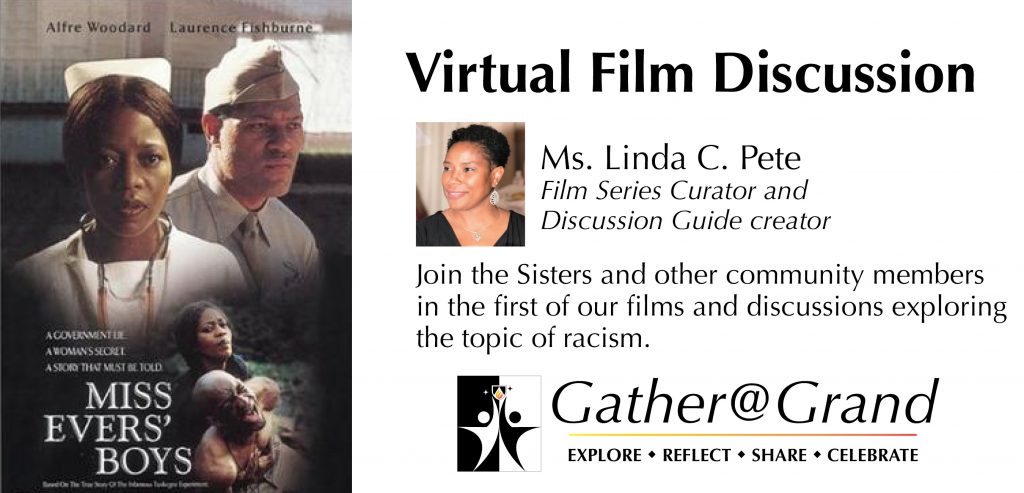Talking About Injustice through Film Study

“Racism: Roots, Resolves, and Results” – the topic and basis of discussion and study comes from the New York Times 1619 Project publication and aims to explore why racism is present and how it happened (roots); what might be attempted that would make a difference (resolves); and how such efforts have helped or not and might continue to make our common life richer, or not (results).
When program creators Sisters Barbara Green and Patricia Dougherty, both former faculty members at Dominican University, had to go back to the drawing board due to the pandemic, they culled their contacts and acquaintances seeking some assistance in the only category that could easily move online—film. A former student, Linda Carter Pete, came to mind. Linda was thrilled to hear from her former esteemed professors and eager to get involved. “I thought, ‘wow!’ the Sisters are taking on the topic of racism. It’s so needed and so aligned with my own convictions and energy right now. How could I say no.” Not to mention, Linda holds Sister Barbara and Sister Patty in high regard. As a young history major, she took many classes offered by either of them. She even took on a Religious Studies minor as you was so inspired by Sr. Barbara. “They are my angels!” Linda remarked.
The power-trio hosted their first virtual film discussion last October and are about to offer their sixth film in the series. This partnership has been mutually beneficial, and they find the interest and participation inspiring and hope-filled.
Film curator and discussion leader, Linda Pete offers an interesting perspective and brings life experience to this sensitive topic. Born in Georgia and currently residing in the East Bay, Linda’s formative years had her residing in Thailand, Iran, Okinawa, Belgium, and Germany as a military dependent for sixteen years before returning to Alexandria, Virginia to finish high school. Linda went on to attend Dominican College of San Rafael where she earned her BA in History, a single subject Teaching Credential, and an MS in Education: Curriculum and Instruction. Linda continued her graduate education at Stanford University where she earned her MA in Education: Administration and Policy Analysis as well as her Administrative Credential.
Linda began her teaching career as a substitute in the Oakland Unified School District and then worked in the San Francisco Unified School District. She taught in middle and high schools for seven years before becoming an administrator. She has spent the last twenty-two years supporting school communities in San Francisco and now works with Mt. Diablo Unified School District in Concord, California. Linda has also taught “Voice, Equity, Diversity, and Social Justice” in the Teaching Credential Program at Chapman University at their Concord and Fairfield campuses, and Children’s Church for children (ages 5-11). Navigating the world of education during a global pandemic has only served to broaden her perspective.
In curating the films, Linda has followed the sequential order established by Sr. Barbara Green as a foundation to better understand the multifaceted sides of racism and systemic injustice. There needs to be an understanding of history, followed by a time of rebuilding—a conversion of heart, and finally convictions for moving forward with resolve to be better. Linda quite agrees with this flow. “After reading the 1619 Project as a learner I was convinced more than ever that we have to live it to do something about it.” The first film discussed in the series was Amistad.
Five virtual discussions later and counting, Gather@Grand is engaging the community. According to Linda, the attendance has been steady, up to a couple dozen, with many being repeat participants. “It has been very enlightening. Everyone learns. You can hear their passion and commitment to wanting change as they share their thoughts and reactions.” Working through a carefully created study guide (available to all on our website), attendees are prompted and challenged. “For example, in the most recent discussion surrounding Jackie Robinson’s story, 42: The True Story of an American Legend, we looked at the adjectives used to describe Robinson which led to a discussion of the different adjectives used in main stream media today when describing athletes of color. The stereotypes are there, the thoughts are so embedded and passed down from generation to generation.”
The program has been challenging and hope-filled for the Sisters to witness the commitment to dig deep, do the work, and begin to develop a personal understanding of bias. We thank the attendees for their participation and their respect for the topic and for each other. We are inspired by you. Sr. Patty says the diversity of the attendees has “has prompted serious thinking about why and how we need to eradicate racism. Each discussion has ended with an action challenge because it is not enough to just study the problem, we must do something about it.”
While the program has had some twists and turns, Sr. Barbara is pleased with the response and participation. “Clearly this is a topic that resonates today, and I am grateful that the Sisters are able to provide this avenue for discovery and dialogue.” There is one more film discussion scheduled for May 20 about Miss Evers’ Boys [Register online: https://sanrafaelop.org/events/gather-as-if-at-grand-virtual-film-discussion-miss-evers-boys/]. After that, three films and additional study guides will be released for self-guided study over the summer months—consider creating a film group of your own and use our guides and resources to facilitate rich dialogue. Stay tuned for future programming information on Gather@Grand as we look forward to a time in the not-so-distant future when we can gather at Grand once again.
 USA
USA


